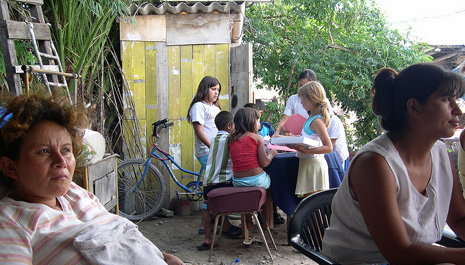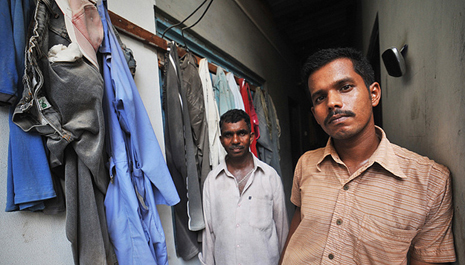International Standards
(Research papers and policy briefs below)
International Standards such as International Human Rights Conventions, International Labour Standards and other instruments provide the normative foundations for the rule of law and they offer specific standard text formulations for national laws. They constitute a fundamental pillar for the rights-based approach to migration.
International standards applying explicitly to international migration and migrants are found in five areas of international law:
- International Human Rights law, notably the nine fundamental Human Rights Conventions comprising the two Covenants respectively on Political and Civil Rights and on Economic, Social and Cultural Rights, along with the International Conventions addressing specific groups and situations: victims of racial discrimination, victims of torture, women, children, migrant workers, and persons with disabilities.
- International Labour Standards, in effect all of them, except where - rarely - foreign workers are exempted.
- Refugee and asylum law, namely the 1951 Convention and the 1967 Protocol on the Status of Refugees
- Consular Relations, namely the Vienna Convention on subject
- International Criminal Law, namely the Protocols on Trafficking in Persons and on smuggling of migrants of the International Convention on Transnational Organized Crime.
Regional standards, in some cases Conventions, address human rights, migration and refugees explicitly in Africa, the Americas, Asia, the CIS and Europe.
International Conventions on Human Rights and International Labour Standards lay out three basic principles of international law:
- Equality of treatment and non-discrimination between regular migrant/immigrant workers and nationals in the realm of employment and work.
- Universal human rights apply to all migrants, regardless of status.
- The broad array of International Labour Standards providing protection in treatment and conditions at work - safety, health, maximum hours, minimum remuneration, non-discrimination, freedom of association, maternity, etc. - apply to all workers.
Three complementary, sequential international conventions on migration and migrant workers provide the core foundation for rights based, regulatory and cooperative governance of migration: ILO Convention 97 on Migration for Employment (1949), ILO Convention 143 on migrant workers (Supplementary Provisions) of 1975, and the 1990 International Convention on the Protection of the Rights of All Migrant Workers and Members of Their Families (ICRMW). These three instruments contain a comprehensive set of legal norms for governance and administration of migration, for international dialogue and cooperation, and for recognition and protection of universal human rights including labour rights that apply to all migrant workers and members of their families, and in effect to all migrants. ( Texts, ratification status and related information available respectively at: http://www.ilo.org/dyn/normlex/en/f?p=1000:12001:::NO::: and http://www.ohchr.org/EN/ProfessionalInterest/Pages/CMW.aspx )
Protection of rights of all migrants cannot be realized nor enforced without recognition in national law and practice. Ratification of these instruments and incorporation of their provisions in national legislation is the necessary foundation for national and local governance and regulation of migration under the rule of law. In reality, as of 26 November 2023, 96 States (half of the UN membership) have ratified at least one of these three instruments, 15 Council of Europe participating States, 35 African Union Member States and nearly all States in Central and South America have ratified one or more of these three conventions. Counting in the additional signatories of the ICRMW that have not ratified any of these Conventions, 101 countries worldwide are legally committed to uphold legal standards governing migration and protecting rights of migrants.
GMPA Associates have been instrumental in obtaining ratifications of International Standards and practical measures ensuring protection of migrants as well as effective governance of migration in numerous countries. GMPA offers technical expertise and advisory support for implementation of international instruments, in cooperation with normative institutions such as OHCHR and ILO.
Documents and Papers- New! 15 December: Jane Aeberhard-Hodges, GMPA Associate, former ILO Gender Equality Director, spoke on Human rights in the context of the 75th anniversaries of the UDHR and the Freedom of Association as a fundamental human right at CoNGO 75th Anniversary Commemoration in Geneva and the CoNGO Sixth Global Thematic Webinar: CoNGO and UDHR: Celebrating 75 Years. (Geneva, Ecumenical Centre and Online on Zoom). See Speaking text and Concept note.
- New! Ratifications of conventions on migration goverance / migrants rights (ILO C-97 & C-143, ICRMW), updated 26 November 2023
- New! Cote d'Ivoire became 59th State Party to the 1990 International Convention on the Protection of the Rights of All Migrant Workers and Members of Their Families, acceding to the ICRMW on 26 September 2023.
- New! The Congo (Brazzaville) ratified both ILO Conventions C-97 and C-143 on migration for employment/migrant workers, on 26 October, becoming one of several 'champion countries' to have ratified all 3 migration governance/migrants rights conventions.
- Nigeria ratifies ILO Convention 143 on migrant workers & C-181 on private employment agencies; GMPA contribution. (6 May 2023)
- The Global and African Legal Normative Frameworks and Policy Guidance on protection of migrants and migration governance, Resource Briefing Paper, P.Taran, Aug.2022
- Rapporteur Summary, Global Parliamentary Conference on refugees and migration, Istanbul, June 2022
- Migration, Human Rights & Sustainable Economies: A Century 21 Agenda. P. Taran, 2022, Revista Tecnológica - Espol.
- La Pandemia de Covid y Los Migrantes: una Agenda de Diez Puntos Para Mitigar el Desastre en Curso. P. Taran & N. Solorzano Alcivar (2021).
- Malaysia: Review of admission and recruitment practices of Indonesian workers in the plantation and domestic work sectors and related recommendations. P.Wickramasekara, ILO, 2020.
- Accession with low compliance: Sri Lanka’s experience with the 1990 International Convention on Migrant Workers. P.Wickramasekara, 2019.
- Effective return and reintegration of migrant workers with special focus on ASEAN Member States. P.Wickramasekara, ILO, 2019.
- Migration, Development, Integration & Human Rights: Global Challenges in the 21st Century. Taran, 2018.
- Report of the Workshop for the development of a training and capacity building plan on the role of labour institutions and migration authorities/agencies on labour migration governance, IOM-AU-ILO, 2018
- Promoting better regional cooperation towards smart and humane migration across the Mediterranean: Rapporteurs Summary Statement. Taran, 2017.
- Promoting a Rights-based Approach to Migration, Health, and HIV and AIDS: A Framework for Action. ILO, 2017. Researched and written by P.Taran with GMPA team.
- Cities welcoming refugees and migrants: enhancing effective urban governance in an age of migration. UNESCO-ECCAR-GMPA, 2016.
- Migrants and Refugees Have Rights Caritas Europa, 2015, researched and written by GMPA team
- Handbook for Parliamentarians: Migration, Human Rights and Governance. IPU-ILO-OHCHR, 2015
- The Key Role of International Labour Standards in Defending Rights of Non-Nationals, TARAN 2011.
- EU Migration Policy, International Law and External Relations: Are Interests Defying Standards? TARAN, 2010.
- Globalization and Migration: The Imperative for a Rights Based Approach, TARAN, 2008.
- International Norms: The Essential Foundation for Effectively Regulating Migration, TARAN, 2008.
- International Legal Standards and Policy Frameworks: Essential Parameters for Regulating Migration in Central Asia, TARAN, 2006.
- International Conventions on Migration: Ensuring Regulation under the Rule of Law, TARAN, 2004.
- The Key Role of International Labour Standards in Defending Rights of Non-Nationals, TARAN, 2002.





